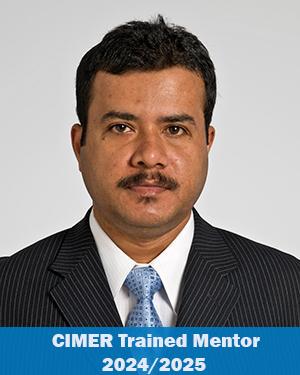Research News
08/31/2020
New NIH Grant Awarded to Interrogate a Novel Bronchodilator Candidate to Treat Asthma
Dr. Ghosh will use the support to investigate for the first time how targeting the nitric oxide receptor may offer alternative bronchodilatory benefits that can help treat severe asthma.

Arnab Ghosh, PhD, has received a four-year, $1.6 million R01 grant from the National Heart, Lung, and Blood Institute, part of the National Institutes of Health, to study how dysfunction of the nitric oxide receptor, soluble guanylate cyclase (sGC), contributes to inflammatory asthma and may be targeted to treat the disease. This follows an earlier one-year R56 bridge award for the same proposal.
This new award will enable Dr. Ghosh to expand on his previous findings that high levels of nitric oxide are associated with sGC dysfunction, which ultimately inhibits the bronchodilatory effects of nitric oxide.
"We found that sGC activators, which are small molecules or drugs that mimic the sGC heme pocket to 'jump start' and activate sGC independent of nitric oxide, can actually rescue the benefits of nitric oxide-based bronchodilation," said "Dr. Ghosh, a staff scientist in the Department of Inflammation and Immunity. "We are eager to further interrogate these activators as a possible new type of bronchodilator to treat asthma, and to take a closer look at why exactly sGC function changes based on high nitric oxide levels."
Dr. Ghosh will use the support from this grant to explore his hypothesis that high nitric oxide levels may affect sGC function in a heme-dependent manner. Low nitric oxide levels trigger the insertion of a heme group (the iron-containing element in blood) into the sGC receptor. As Dr. Ghosh explained, then, it reasons that perhaps sGC, which is a hemeprotein, becomes heme-deficient when nitric oxide levels are high.
In addition to examining sGC molecular and cellular signaling in the presence of high nitric oxide levels, the researchers will also study human airway smooth muscle cells to determine whether defective sGC or heme-free sGC is present in asthmatic patients.
"Being awarded this R01 grant, my first, has been exciting to say the least," said Dr. Ghosh. "It's a major milestone in the career of a scientist, and it will provide an opportunity to explore an alternative pathway in the airways that we may be able to target to treat asthma."
"Ours is the first team of scientists to attempt to use sCG alternative pathways to treat asthma cells and it has been high energy, creative work. Working at Lerner Research Institute and being awarded these grants has definitely been a win-win situation."
Dr. Ghosh's previous studies, in collaboration with Dennis Stuehr, PhD, into hemeprotein maturation laid important groundwork for this project.
Featured Experts
News Category
Related News
Research areas
Want To Support Ground-Breaking Research at Cleveland Clinic?
Discover how you can help Cleveland Clinic save lives and continue to lead the transformation of healthcare.
Give to Cleveland Clinic